|
|
|
Sort Order |
|
|
|
Items / Page
|
|
|
|
|
|
|
| Srl | Item |
| 1 |
ID:
153911
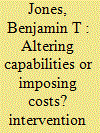

|
|
|
|
|
| Summary/Abstract |
How do military interventions affect the outcome of civil wars? The diversity of military interventions makes it difficult to answer this question; their variation means that they do not affect civil wars in a straightforward way. In particular, strategy and timing play a pivotal role in determining the effect of an intervention. Thus, I isolate three intervention strategies: indirect (bolstering the capabilities of the supported side), direct-conventional (degrading the capabilities of the opposition), and direct-unconventional (imposing costs on the opposition). I evaluate the impact of these strategies on the outcome of civil wars using a dataset of all civil wars from 1944 to 2007. My analysis reveals that the efficacy of intervention strategies varies over time. Third-party support for rebel organizations is most effective during a critical window early in a civil war. In contrast, direct military assistance for the government increases the odds of a government victory only once a civil war becomes protracted. It also reduces the odds of a negotiated outcome to the conflict, whereas indirect support for the government proves most effective early in the war. This work demonstrates that pooling all interventions together risks overlooking important differences in their effects on civil wars. It also carries with it important implications for states considering interventions in civil wars.
|
|
|
|
|
|
|
|
|
|
|
|
|
|
|
|
| 2 |
ID:
153925
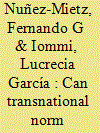

|
|
|
|
|
| Summary/Abstract |
Norm cascades often spark resistance from states under pressure to conform. Some react by further distancing themselves from the norm—a process known as “norm backlash.” We identify a particular kind of norm backlash: the creation of legal barriers aimed at fending off a transnationally diffusing norm by blocking the ability of local actors to advocate for it. We call this phenomenon “norm immunization” and provide an account of the conditions that bring it about. In this account, transnational advocacy increases the local salience of the norm, which is discursively constructed as a national threat that calls for defensive regulations against the advocacy of the threatening norm. Using this model, we analyze Uganda’s immunization against LGBT rights as instantiated in the Anti-Homosexuality Act of 2014. We find that the successful efforts of LGBT rights advocates elsewhere indeed precipitated the discursive construction of those rights as a national threat in Uganda, thereby unintentionally contributing to the adoption of the norm-immunizing law.
|
|
|
|
|
|
|
|
|
|
|
|
|
|
|
|
| 3 |
ID:
153924
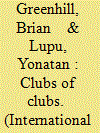

|
|
|
|
|
| Summary/Abstract |
Has international cooperation become fragmented in recent decades? We focus on a specific form of potential fragmentation in the international system: the extent to which the network of intergovernmental organizations (IGOs) consists of distinct clusters of closely cooperating states. IR scholars—including those with an interest in the causes and consequences of membership in IGOs—pay relatively little attention to the structure of the larger IGO network. At the same time, scholars concerned with fragmentation often assume that it has increased without clear measures of this phenomenon. We use the network analytic technique of modularity maximization to show that throughout the post–World War II period, the structure of the IGO network can generally be divided into distinct groups of states on the basis of their shared IGO memberships. Yet we also show that temporal trends indicate that the IGO network has become less fragmented in recent decades, suggesting that cooperation via these organizations has become more global and less regional. Our findings indicate that, at least as far as cooperation through formal organizations is concerned, fragmentation has decreased in recent decades.
|
|
|
|
|
|
|
|
|
|
|
|
|
|
|
|
| 4 |
ID:
153908
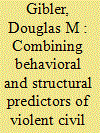

|
|
|
|
|
| Summary/Abstract |
Large-N studies of civil war overwhelmingly consider the state-specific structural conditions that make conflict likely. Meanwhile, policymakers often ignore these factors and instead search for patterns among the behavioral triggers of violence. This article combines these approaches. I use conflict narratives from the International Crisis Group’s CrisisWatch publications to cross-validate structural analyses of civil conflict and confirm the mechanisms that lead to outbreaks of violence in conflict-prone countries. I then correct for selection bias in the narrative data with an underlying model of conflict likelihood. I find that several indicators thought to be causally related to civil conflict do indeed continue to have an effect after selection. However, the narrative data overemphasizes both the importance of several low-intensity, separatist conflicts within developed democracies and the potential for conflict among oil-rich states. These analyses highlight the importance of combining structural, large-N analyses with qualitative assessments of conflict zones. My findings also provide support for a state-capacity explanation of conflict behavior.
|
|
|
|
|
|
|
|
|
|
|
|
|
|
|
|
| 5 |
ID:
153923
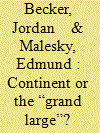

|
|
|
|
|
| Summary/Abstract |
We argue that NATO allies exhibiting more “Atlanticist” strategic cultures allocate a greater share of their defense resources to Alliance priorities than those exhibiting “Europeanist” strategic cultures. Our analysis builds on policy discussions regarding imbalances in burden-sharing in transatlantic security. Scholarship in the fields of international security and political economy offers plausible explanations for these imbalances, but does not address how allies allocate resources within defense budgets and does not statistically test effects of cultural variables on such decisions. Using evidence from 89 national security strategy documents of 24 NATO allies, we argue that the more states’ strategic cultures tend toward Atlanticism, the more resources they allocated to military operations during a period in which such operations were the Alliance’s top priority. During the height of NATO’s “out of area” period from 2000 to 2012, there was a strong, positive correlation between, on the one hand, Atlanticist language in such documents and, on the other, allies’ allocation of financial resources to military operations—as opposed to personnel, infrastructure, or equipment.
|
|
|
|
|
|
|
|
|
|
|
|
|
|
|
|
| 6 |
ID:
153919


|
|
|
|
|
| Summary/Abstract |
France took a hardline stance against Tehran’s nuclear program. Yet for several decades, the French government adopted a softer line with regard to nonproliferation. France was the last permanent member of the UN Security Council to ratify the 1968 Non-Proliferation Treaty (NPT). In the 1960s and 1970s, Paris sold nuclear facilities to Israel, Iran, and Iraq, some of which had potential military uses. Why did France change its policy on nonproliferation? By reconstructing the evolution of France’s position with respect to Iraq’s and Iran’s nuclear programs since the 1970s, this article explains how Paris shifted from reluctant loner to one of the main promoters of the norm of nonproliferation. The changing role of a second-tier power stems from transformations in the division of diplomatic labor inside and outside the state. Drawing on archival and interview data, we show how a group of French diplomats, followed by political leaders and nuclear scientists, mobilized the nonproliferation norm and carved out a role for France in the international system. Throughout this period, successive presidents faced fragmented domestic fields in which bureaucratic and political struggles shaped French policy. These struggles refracted the impact of the international system on France’s slow and uneven convergence with the US position.
|
|
|
|
|
|
|
|
|
|
|
|
|
|
|
|
| 7 |
ID:
153906


|
|
|
|
|
| Summary/Abstract |
States traditionally build walls to repel the armies of adversaries and consolidate control over territory. More recently, the growth in violence by nonstate groups has led governments to use fences to prevent insurgent activity and transnational terrorism. This practice, which has accelerated since the end of World War II, challenges liberal expectations of a borderless world. We use a new and unique data set on twentieth century interstate border barriers to evaluate the effectiveness of fencing as a defense against transnational terrorist attacks. The strategic nature of barrier construction makes the assessment of causal effects complex. However, our analyses suggest that fences reduce the annual relative risk of a terrorist attack by at least 67 percent. Much of the literature on transnational terrorism focuses on variables such as democracy, development, and distance—that is, factors that are difficult for policy-makers to manipulate. But our analysis suggests that fencing may provide an effective policy tool for leaders seeking to insulate their states from transnational terrorist attacks.
|
|
|
|
|
|
|
|
|
|
|
|
|
|
|
|
| 8 |
ID:
153926


|
|
|
|
|
| Summary/Abstract |
Does increased judicial independence lead to increased state respect for empowerment rights? Initial research on this topic suggested an affirmative answer, but new data calls this into question. We use new measures and modeling approaches to re-examine the effect of de facto judicial independence on state respect for empowerment rights. Empowerment rights include the rights to electoral self-determination, domestic movement, foreign movement, religious freedom, freedom of speech, and assembly and association. These rights are vital to democratic governance. They affect citizens’ fundamental relationships with their government: the ability of citizens to criticize the government, the ability to live according to their belief systems, and their ability to seek refuge from repressive governmental actions. Our analysis reveals a positive, and robust, association between de facto judicial independence and state respect for these rights. We also examine two potential mechanisms that might explain this association. We conclude that the presence of de jure protections of organizational rights conditions the effect of de facto judicial independence on respect for empowerment rights. Our findings suggest that other domestic institutions, such as constitutional provisions that protect organizational rights, may also help improve state respect for empowerment rights.
|
|
|
|
|
|
|
|
|
|
|
|
|
|
|
|
| 9 |
ID:
153921


|
|
|
|
|
| Summary/Abstract |
Why would leaders engage in international cooperation if they believe that their own government might default from their commitments? Some suggest that when leaders do so, they are essentially trying to profit from false promises—from making international commitments that they likely cannot, or will not, actually fulfill. In contrast, others expect that fears of such non-compliance will deter leaders from engaging in international cooperation. Moreover, some theories suggest that the design of cooperative agreements themselves should affect how leaders respond to these possibilities. That is, leaders should be more concerned about the prospect of their country’s non-compliance with agreements that impose, through formal means, sizeable costs on recalcitrant states. We describe the results of an experimental survey conducted on 95 high-level policy elites in the United States that allows us to examine the causal dynamics that underlie this debate. We focus on one key institutional design feature—formal enforcement—and preferences for international cooperation under different perceptions of risk about future compliance. We provide the first elite-level evidence that, as the prospect of defection rises, actual policymakers become less willing to join international agreements. However, contrary to what many theories of international institutions would predict, the presence of a formal enforcement mechanism fails to explain their aversion to cooperation. Elites dislike making false promises even when their commitments are not formally enforceable. By measuring these elites’ patience (along with other traits), we tentatively suggest that this aversion may be linked to decision-makers’ own perceptions of the future—elites who have lower discount rates are particularly sensitive to the prospect of not honoring commitments.
|
|
|
|
|
|
|
|
|
|
|
|
|
|
|
|
| 10 |
ID:
153918
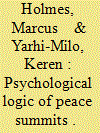

|
|
|
|
|
| Summary/Abstract |
Why do some peace summits succeed while others fail? We offer an explanation that highlights the importance of empathy between leaders. Studies in negotiations and psychology show that empathy—the ability to take the perspective of others and understand their cognitive and affective states without necessarily sympathizing with them—is critical in overcoming biases, transcending long-held enmities, and increasing the likelihood of cooperation. We show that empathy is perceptual in nature. Actors can convey it through both words and expressive behaviors in face-to-face interactions. From these, leaders gain an understanding of whether the other side is willing to negotiate in good faith and what a potential agreement might look like. Additionally, we argue that all is not lost if the leaders of warring states prove unable to cultivate these beliefs about each other. A skilled mediator can step in and build relational empathy between disputants. We assess the empirical ramifications of conveyed and relational empathy by comparing two of the most salient Middle East peace process summits with divergent outcomes: success at Camp David 1978 and failure in 2000.
|
|
|
|
|
|
|
|
|
|
|
|
|
|
|
|
| 11 |
ID:
153905
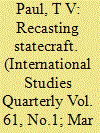

|
|
|
|
|
| Summary/Abstract |
Much of mainstream International Relations (IR) scholarship considers war to be a precondition for significant changes at the systemic level. Peaceful change as a subject has received limited attention in Realism, except by E. H. Carr and Robert Gilpin, although several strategies for stability are present in the paradigm. Mechanisms inherent in Liberalism have offered the most insights on obtaining change without war. Constructivism also focuses on change, caused largely by norms and inter-subjective ideational forces. Yet concrete strategies for peaceful change at the international level remain elusive in much of IR theory. The traditional grand strategy literature has focused most attention on obtaining national objectives through war while ignoring peaceful mechanisms of change and transformation. This article, based on my presidential address at the 57th ISA Convention in Atlanta in March 2016, calls for a reorientation in the grand strategy literature by incorporating strategies of peaceful change. It examines the contributions for peaceful change made by Europe, the United States, and rising and resurgent powers Russia, China, India, Brazil, and South Africa, in addition to ASEAN as a regional grouping. The article concludes by asking why some of these countries pursued peaceful strategies of change at various points in time only to abandon them subsequently. The article calls on the IR discipline to think more clearly about strategies for peaceful change and foreign policymakers to adapt and reorient succeeding generations to seek change without violence as a subject matter of serious study.
|
|
|
|
|
|
|
|
|
|
|
|
|
|
|
|
| 12 |
ID:
153914


|
|
|
|
|
| Summary/Abstract |
I propose a relational understanding of ontological security, based on a synthesis of pragmatist philosophy and relational sociology. This relocates the referent of ontological security from the self to the social arrangements where action takes place. It implies that actors seek not to secure the coherence and stability of self in particular, but rather of their broader social context. By taking this relational approach, international relations scholars may avoid methodological difficulties in accessing or defining the cognitive or affective processes shaping certain actors, while honing in on the social embeddedness of action. I outline three causal mechanisms for theorizing ontological security in particular cases: refereeing, performative deference, and obstructive resistance. I do so with reference to prominent methodological frameworks in relational sociology—namely, those based on fields and on figurations, respectively. Finally, I connect this new approach to theorizing ontological security to existing trends in relational international relations research. I argue that it provides a theoretical architecture more sensitive to action and agency than is offered by many existing relational approaches, and is especially well suited to the study of precarious forms of transnational life.
|
|
|
|
|
|
|
|
|
|
|
|
|
|
|
|
| 13 |
ID:
153916
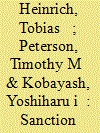

|
|
|
|
|
| Summary/Abstract |
Recent research disputes the conventional wisdom that “sanctions do not work.” It demonstrates that states may impose sanctions for purposes beyond seeking an immediate change in the behavior of targeted regimes. For example, democratic leaders often impose sanctions to satisfy their own domestic constituencies. However, we know little about how the consequences of sanctions shape whether or not citizens favor them. Building on insights from prior studies on the use and consequences of sanctions, we develop theoretical expectations regarding the aspects of sanctions that citizens might favor or disfavor. We use these to design and conduct a survey experiment to explore degrees of support for proposed sanctions. We find that on average, citizens support proposed sanctions that they expect will have a long-run impact on the behavior of the targeted state.
|
|
|
|
|
|
|
|
|
|
|
|
|
|
|
|
| 14 |
ID:
153915


|
|
|
|
|
| Summary/Abstract |
Western powers often turn to international sanctions in order to exert pressure on incumbent governments and signal their support for the opposition. Yet whether, and through what mechanisms, sanctions trigger protest remains unclear. We argue that sanction threats work as an international stamp of approval for would-be protesters; they encourage collective action against governments. Moreover, sanction threats send particularly clear and coherent signals if multiple senders issue them and if they focus on human rights, which makes such sanctions threats more effective in sparking social unrest. Using count models of protest activity, we find strong support for our arguments. We corroborate our findings with qualitative evidence from the case of Zimbabwe.
|
|
|
|
|
|
|
|
|
|
|
|
|
|
|
|
| 15 |
ID:
153909


|
|
|
|
|
| Summary/Abstract |
Why do armed groups ever direct violent attacks against humanitarian organizations? While scholars have analyzed wartime violence against civilians, little research exists on violence against other noncombatants, like humanitarian organizations. Violence against aid workers, however, is common in wartime, with devastating consequences for civilians, who suffer when aid organizations respond by reducing services. This article argues that much of the violence against humanitarian organizations is strategic. By serving as substitute providers of public goods, aid organizations can bolster the government. Insurgents thus target aid workers in an effort to force them out of particular regions, undermining government support. To test this argument, we analyze variation in violence across space and time using an original panel dataset on attacks against aid workers in Afghanistan, 2008–2012. Despite aid organizations’ attempts to remain neutral, we find evidence that insurgents strategically target aid workers in areas where their services likely strengthen government support.
|
|
|
|
|
|
|
|
|
|
|
|
|
|
|
|
| 16 |
ID:
153912


|
|
|
|
|
| Summary/Abstract |
Two broad positions—the “gap-bridgers” and the “gap-minders”—dominate the current debate on the (lack of) political relevance of International Relations (IR) theory. Missing from this debate, however, is a broader theoretical framework for contextualizing—and moving beyond—their disagreements. Hence, this article provides a theoretical account of the relationship between politics and knowledge. It shows that, in the modern context, scientific knowledge achieves political relevance by distancing itself—through theorizing—from the particularities of politics. This paradoxical relationship gives rise to three different dimensions of political relevance, which operate at different levels of abstraction. Metatheory plays a crucial role in constituting the modern conception of politics; theories establish concrete political spaces; and empirical studies can influence specific policies. Taking this context into account, moreover, calls for a reassessment of core features of the discipline: its supposed poverty, fragmentation, and immaturity are common features of all modern sciences; they function as a driver of scientific progress; and metatheoretical debates address the political dimension of the modern sciences. Hence, the source of IR’s political relevance lies in its theoretical foundations. Abandoning theory in favor of policy-oriented studies would simultaneously undermine the discipline’s policy relevance and its standing as a modern science.
|
|
|
|
|
|
|
|
|
|
|
|
|
|
|
|
| 17 |
ID:
153922


|
|
|
|
|
| Summary/Abstract |
Recent research demonstrates that larger and better-equipped United Nations peacekeeping missions more effectively ensure peace and security. This raises an important question: what explains the willingness of member-states to contribute the substantial numbers of troops needed to achieve peacekeeping goals? We argue that narrow member-state security interests offer an important explanation. We find that states embroiled in an ongoing rivalry with another state in the international system contribute more personnel to ongoing missions. Additionally, we find that regimes concerned about coup attempts increase deployments to peacekeeping operations. In a more general sense, this article suggests that the provision of security by peacekeeping operations to their host states is partially dependent upon higher levels of insecurity elsewhere in the international system.
|
|
|
|
|
|
|
|
|
|
|
|
|
|
|
|
|
|
|
|
|